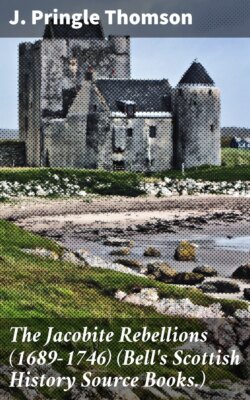Читать книгу The Jacobite Rebellions (1689-1746) (Bell's Scottish History Source Books.) - J. Pringle Thomson - Страница 20
На сайте Литреса книга снята с продажи.
C. Why the Colony Failed (1698).
ОглавлениеTable of Contents
Source.—Bishop Burnet's History of His Own Times, vol. iv., p. 395. (Oxford: 1833.)
… The company in Scotland, this year, set out a fleet, with a colony, on design to settle in America: the secret was better kept than could have been well expected, considering the many hands in which it was lodged; it appeared at last, that the true design had been guessed, from the first motion of it: they landed at Darien, which, by the report that they sent over, was capable of being made a strong place, with a good port. It was no wonder that the Spaniards complained loudly of this; it lay so near Porto Bello and Panama on the one side, and Carthagena on the other, that they could not think they were safe, when such a neighbour came so near the centre of their Empire in America: the King of France complained also of this, as an invasion of the Spanish dominions, and offered the court of Madrid a fleet to dislodge them. The Spaniards pressed the King hard upon this: they said, they were once possessed of that place; and though they found it too unhealthy to settle there, yet the right to it belonged still to them: so this was a breach of treaties, and a violent possession of their country. In answer to this, the Scotch pretended, that the natives of Darien were never conquered by the Spaniards, and were by consequence a free people; they said, they had purchased of them leave to possess themselves of that place, and that the Spaniards abandoned the country, because they could not reduce the natives: so the pretension of the first discovery was made void, when they went off from it, not being able to hold it; and then the natives being left to themselves, it was lawful for the Scots to treat with them: it was given out, that there was much gold in the country. Certainly, the nation was so full of hopes from this project, that they raised a fund for carrying it on, greater than, as was thought, that kingdom could stretch to; four hundred thousand pounds sterling was subscribed, and a fourth part was paid down, and afterwards, seventy thousand pounds more was brought in, and a national fury seemed to have transported the whole kingdom, upon this project.
… Our English plantations grew … very jealous of this new colony: they feared, that the double prospect of finding gold and of robbing the Spaniards, would draw many planters from them into this new settlement; and that the buccaneers might run into them: for by the Scotch act, this place was to be made a free port; and if it was not ruined before it was well formed, they reckoned it would become a seat of piracy and another Algiers in those parts. Upon these grounds, the English nation inclined to declare against this, and the King seemed convinced, that it was an infraction of his treaties with Spain: so orders were sent, but very secretly, to the English plantations, particularly to Jamaica and the Leeward islands, to forbid all commerce with the Scots at Darien. The Spaniards made some faint attempts on them, but without success. This was a very great difficulty on the King; he saw how much he was like to be pressed on both hands, and he apprehended what ill consequences were like to follow, on his declaring himself either way.
